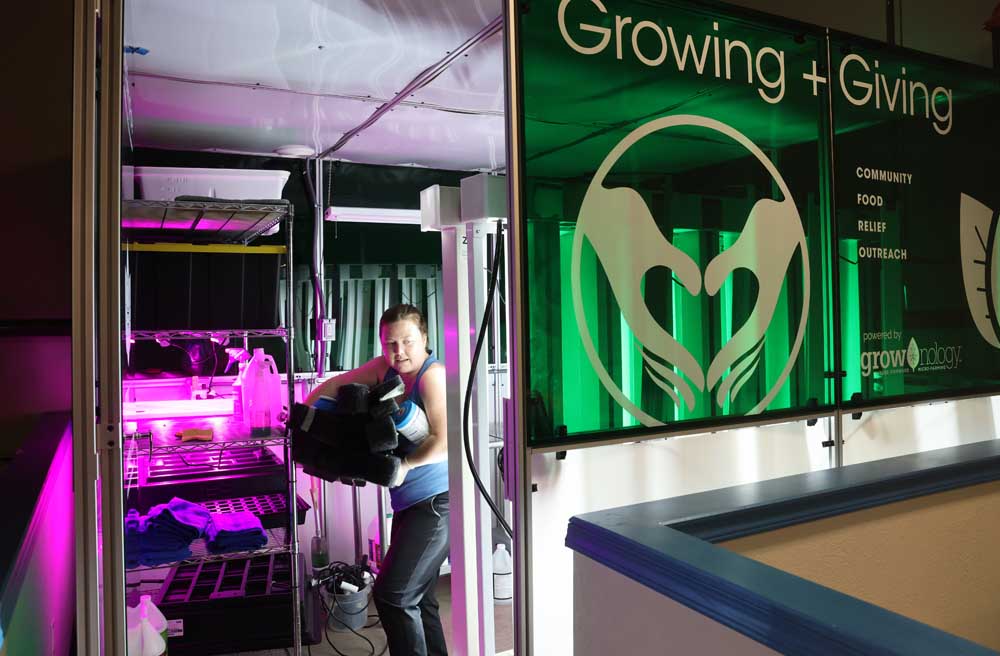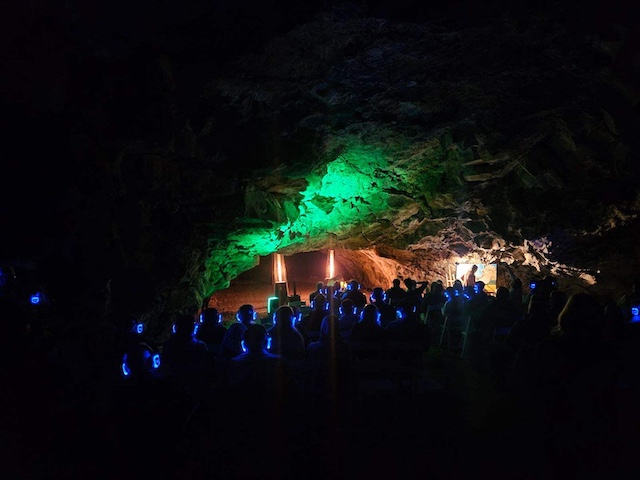Hydroponic gardening is faster, more efficient, and better on the environment
Published 5:45 pm Monday, March 28, 2022

- Makena Mehringer works in the vertical hydroponic farm at the Giving Plate in Bend.
The hydroponic farm inside the Giving Plate food pantry is expanding after being disrupted by the pandemic.
The farm, built on site at the Giving Plate, is a collaboration with the nonprofit Around the Bend Farms, which aims to produce locally grown, nutritious vegetables for people in Bend who are food insecure or do not have access to fresh produce.
The project also hopes to make vertical, hydroponic farming more accessible to the general public, and in addition to providing nutritious food, hopes to teach people about the importance of nutrition, and to spark interest in farming.
Bend is a High Desert region with a growing population that relies on food being trucked in from places like the Willamette Valley. The current model of growing food on traditional agricultural farms, harvesting it and then trucking it long distances is not only costly, but trucking food means it is less nutritious by the time it reaches a table.
Hydroponic gardens use water, not soil, to grow vegetables. Nutrients are dissolved in the water, which allows the produce to grow much faster.
Vertical, hydroponic farming is a way to produce fresh produce while using less space and less water. It is also faster than traditional farming, and vertical gardens are popping up in cities and towns like Bend, where they are built inside of existing buildings to grow a variety of different foods in a controlled environment.
The farm inside the Giving Plate was built and producing food in the summer of 2020, but the project struggled to stay open at times during the pandemic. The farm started by producing leafy vegetables like lettuces and kale, and now plans are in motion to improve the farm’s technology and to grow other types of produce.
The method was developed by NASA as a way to grow food in space, but people like Ben Marsh, the co-founder of Around the Bend Farms, and his colleagues working on the project thought it would be a better idea to use the same method to grow food on earth.
“The technology actually existed before we learned how to use it,” Marsh said of hydroponic farming. “It is a bizarre repurposing of existing technology and now people are learning about it, but it’s been around for decades.”
One of the biggest hurdles for the project during the pandemic, aside from supply chain issues, was maintaining a staff on site to run the farm and to keep up with the Giving Plate’s exploding demand, Marsh said.
Marsh said demand for food skyrocketed during the pandemic, increasing by as much as 30% or 40%. All of the project’s resources were going toward distributing food to people in need, but the group succeeded in spite of all the challenges.
“There were so many reasons for this project to come off the rails, but we stuck with it,” Marsh said. “Somehow, miraculously we got this thing built and up and running and we were producing lettuces and some smooth leaf kale.”
Marsh said it was difficult to keep things moving with only volunteers, so Around the Bend Farms and the Giving Plate recently hired a farm manager to run the day-to-day operations and to help push the project forward.
Paige Welsh will run the vertical farm. When she was offered the position, the only right answer for her was yes.
“I value health and community,” Welsh said. “In Bend, the cost of living has increased so much in the past few years, and when money is tight, expensive veggies typically aren’t on the top of anyone’s grocery list, so growing sustainable and nutritious produce for the Giving Plate can help families create balanced meals to nurture their bodies in these stressful times.”
Welsh has a degree in exercise science and nutrition and has worked with plants in the past. However, this is her first time running a hydroponic farm. She said she is enthusiastic and constantly learning.
Welsh said her goal over the summer is to try to grow other things like tomatoes, cucumbers and strawberries, but for the time being, she will grow lettuce. The farm will grow lettuce and produce several heads every four weeks, Welsh said.
“Since it is a vertical garden, we should be able to put out way more in that space than in soil,” Welsh said. “You can stack the plants on top of each other.”
Basically, Welsh said, hydroponic farms can produce all of the delicious, juicy and vitamin-packed produce sold in stores, but locally and more efficiently. That translates into expanded access to fresh produce to those who can’t afford to purchase it at the store.
Right now, Welsh said, the lettuce grown at the farm will be used to create grab-and-go salad packs for guests picking up food at the Giving Plate. The packs will supplement the other items distributed in the food boxes the organization hands out to people on site.
Supplementing a diet with fresh vegetables is key to eating healthy, but one of the bigger goals of the project aside from producing food for those in need is to educate, said Makena Whitaker, co-founder and project manager at Around the Bend Farms.
“The ultimate goal is to get people into farming,” Whitaker said. “One of our visions is to have an education garden like a larger farm where schools and people of all ages can learn how to vertical farm and learn about the basics of plant biology and microbiology.”
Whitaker is a certified nutritionist and understands the importance of eating nutritious food. Supplementing the Giving Plate food boxes with something like lettuce is a way to help ensure people are getting a balanced diet.
“The state of our food system is not great,” Whitaker said. “We’ve tried so many things as a country to support public health, and it’s not working and people are just getting sicker.”
The project is currently fundraising to expand its operation and produce more food using the vertical, hydroponic technique. The plan is to raise money to invest in staffing, new equipment and to build a more advanced system inside the Giving Plate.
To donate to the hydroponic farm project, visit Around the Bend Farms’ website, where there is a donation button near the bottom of the page. Donations can also be sent directly to the organization’s office here in Bend, 1253 NW Hartford Ave., Unit 2.






